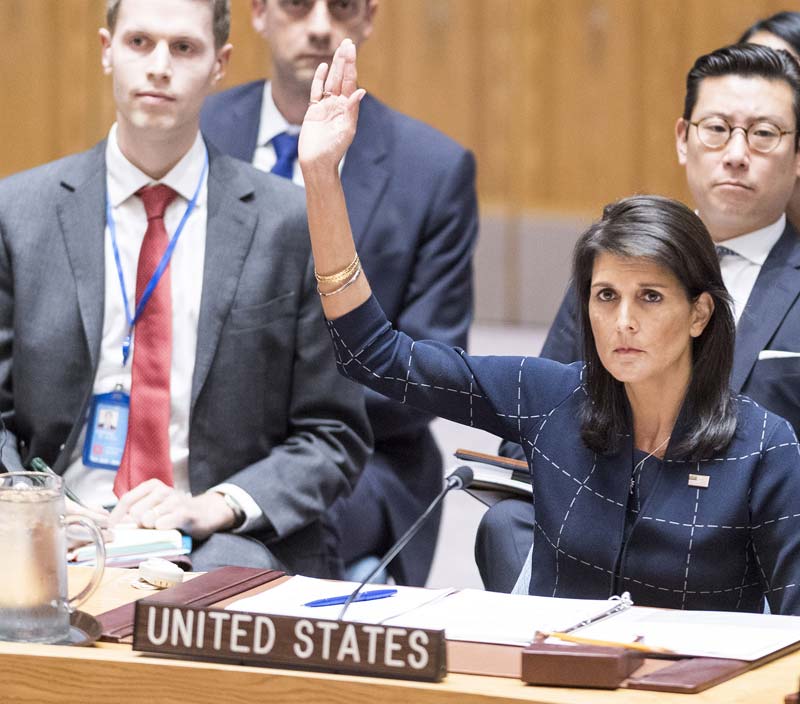 Zuma Wire
Zuma Wire
The exchange between the two diplomats capped a nonbinding vote in which the United States for the first time opposed a resolution introduced every year calling on Israel to end its occupation of the "occupied Syrian Golan." Israel annexed the strategic plateau in 1981, and most Israelis consider it an integral part of the country not up for negotiation.
The resolution, which passed with 151 votes and only Israel and the United States in opposition, declares Israel's jurisdiction over the area "null and void" and a "flagrant violation of international law."
The United States has always abstained in the past, as 14 nations did this year. U.S. ambassador Nikki Haley said Thursday that the United States was changing its vote because of anti-Israel bias and the deaths caused by the Syrian government's attempts to stomp out a rebellion that spiraled into civil war.
"The United States will no longer abstain when the United Nations engages in its useless annual vote on the Golan Heights," Haley said. "If this resolution ever made sense, it surely does not today."
The Trump administration has taken several steps long sought by the Israeli government. Chief among them were the decisions recognize the disputed city of Jerusalem as Israel's capital and to move the U.S. Embassy there from Tel Aviv. Though the Israeli government is based in Jerusalem, most nations keep their missions in Tel Aviv on the principle that its status should be decided through negotiations with the Palestinians who also seek part of the city as their capital.
The United States also has closed the PLO office in Washington and a separate U.S. Consulate that served Palestinian residents of the West Bank and Gaza.
The Israeli government has been lobbying the Trump administration to recognize its sovereignty over the Golan Heights, which is known for its tourist spots and wineries. It also is home to an estimated 22,000 Druze who speak Arabic and have families in Syria.
But the Golan has grown more tense, and a demilitarized buffer zone has been built to separate Israel and Syria. The Syrian side has experienced heavy fighting recently between pro-government forces and opposition rebels, with the latter surrendering much of the area to the Russian-backed government.
The Golan resolution was the last of nine introduced expressing support for the United Nations Relief and Works Agency (UNRWA), and renewing the mandate of the U.N.'s "special committee to investigate Israeli practices affecting the human rights of the Palestinian people and other Arabs of the Occupied Territories."
All the resolutions passed by overwhelming majorities, with no more than 10 votes in opposition.
In remarks after the votes, Syria's U.N. ambassador Bashar Jaafari said the U.S. vote on Golan showed the United States has relinquished its role as a sponsor of peace efforts in the Middle East.
Israel's ambassador Danny Doron thanked the United States for its moral stance on the resolution and said the real threat to the region comes from the government of Syrian President Bashar Assad and the support it gets from Iran.
"Thousands of people are being slaughtered every day by the evil Assad regime," he said. "given the opportunity to slander Israel, the world forgets about the atrocities."
Doron said the Golan Heights is critical for Israel's security, and its rightful territory.
"Israel will not withdraw from the Golan Heights," he said. "it is time for the international community to accept it."
Jafaari objected to the use of the name Golan Heights and said hilltops no longer offer a military advantage in an era of rockets and planes.
"Even if it were true," he added, "this is Syrian territory, and will return to Syria whether Israel likes it or not. But when the Israeli ambassador says Israel will not withdraw from Golan, let him understand before all of you - if Israel does not comply with the return of the occupied Syrian Golan to the people of Syria, it is opening the door to other options. Options of war.
"We will regain the Golan, by peace or by war."
(COMMENT, BELOW)


 Contact The Editor
Contact The Editor
 Articles By This Author
Articles By This Author